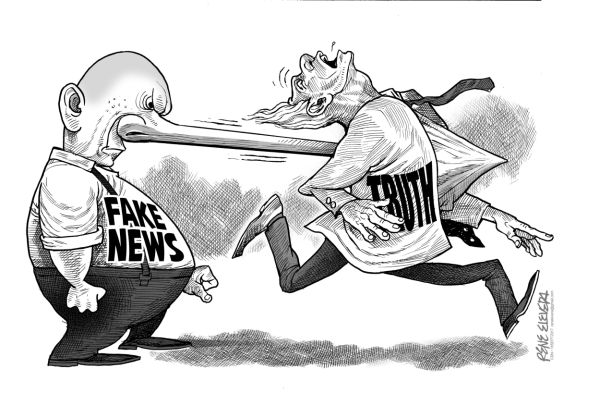
The marketplace of ideas still stands, but its foundations are under attack.
For nearly four centuries, this metaphor has represented the belief that in a free, honest, and transparent competition, the best ideas always win. In democratic societies, freedom of expression, which encompasses freedom of speech and of the press, draws its protection from that belief.
These days, the threat of fake news makes that belief seem naïve. For the marketplace of ideas to work well, consumers must know who provided the available information, how they obtained it, and whether the information is of good quality. False news falls short on all three counts.
Let’s get this clear: not all erroneous articles in mainstream or social media is fake news. In the rush to tell a story first, people make mistakes. That’s misinformation — inaccurate, but not necessarily malicious. Fake news, however, is done deliberately. It is disinformation: “inaccurate or manipulated content that is spread intentionally.”
That definition comes from Facebook, which released last April 27 a white paper on how the social networking site has tried to prevent false news from spreading. Its officials confirmed that thousands of articles had been made to appear as news, but which contained “intentional misstatements of fact.” These were then spread through networks of fake Facebook accounts.
Fake news harms because it erodes our trust in fellow citizens and public institutions. How can we agree to think and act our way out of shared problems when we cannot even agree on a shared set of facts? We are not helpless against fake news, but we must all break out of our echo chambers and act against it.
For platforms, like the tech giants Google and Facebook, the challenge will include working with human fact-checkers and artificial intelligence in order to slow down the spread of fake news.
For teachers and academic institutions, the challenge is to instill fact-checking and to sharpen each student’s ability to make informed judgments.
Part of the challenge is old-school: inspire reading. “Fake news is only a threat to our democracy if we believe it, and it’s only believable if our reading is shallow,” the graphic designer Brian LaRossa wrote last week in Design Observer. “Shallow reading leads to shallow thinking.”
For journalists and media organizations, the threat of fake news should spark an honest reflection on our practices and purpose. Four of the seven training events in the 25th Cebu Press Freedom Week, which opened yesterday, will examine what solutions and tools we and our community of readers, advertisers, and sources can use against disinformation.
Fake news is a real threat to freedom of speech and of the press because it has started to compel political leaders to turn to draconian legislation in an attempt to fight back. In Germany, for example, social media companies may face at least $59 million (about P3 billion) in fines if they refuse to take down stories that the state has defined as “illegal content.”
Here at home, Sen. Joel Villanueva last July proposed fines of P100,000 to P5 million, or one to five years in jail, for anyone convicted of “the malicious creation and distribution of false news.” Yet unless the definition of fake news in Senate Bill 1492 is made more specific, it may be used to punish journalists for honest mistakes and to censor those who use parody or satire as part of political speech.
Consider the danger. As divisive as our interactions can get on some days, the free movement of concerned citizens’ ideas is still preferable to giving the government more control over our public conversations.
Disclaimer: The comments uploaded on this site do not necessarily represent or reflect the views of management and owner of Cebudailynews. We reserve the right to exclude comments that we deem to be inconsistent with our editorial standards.




